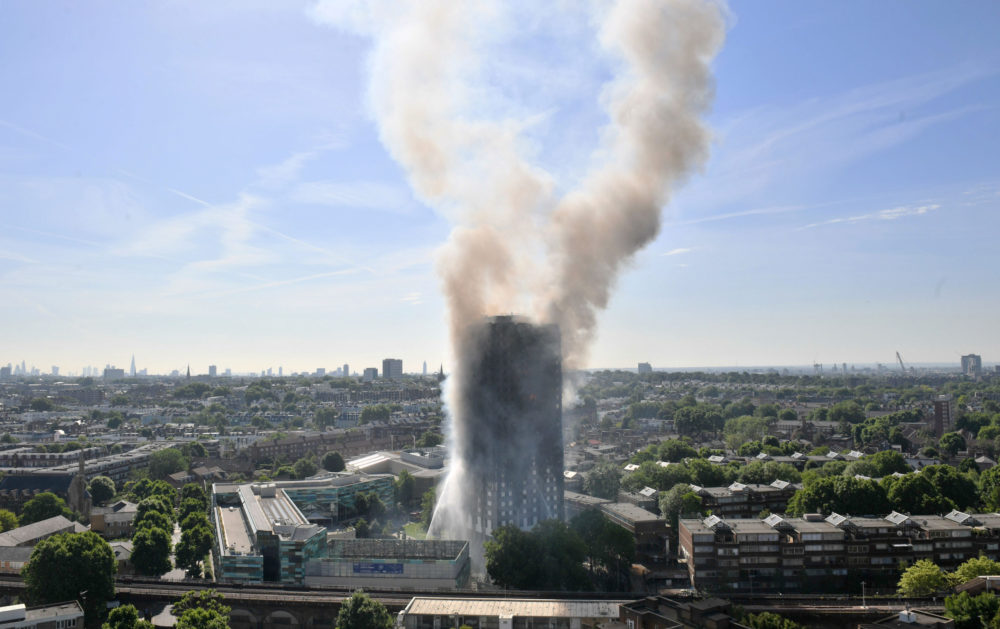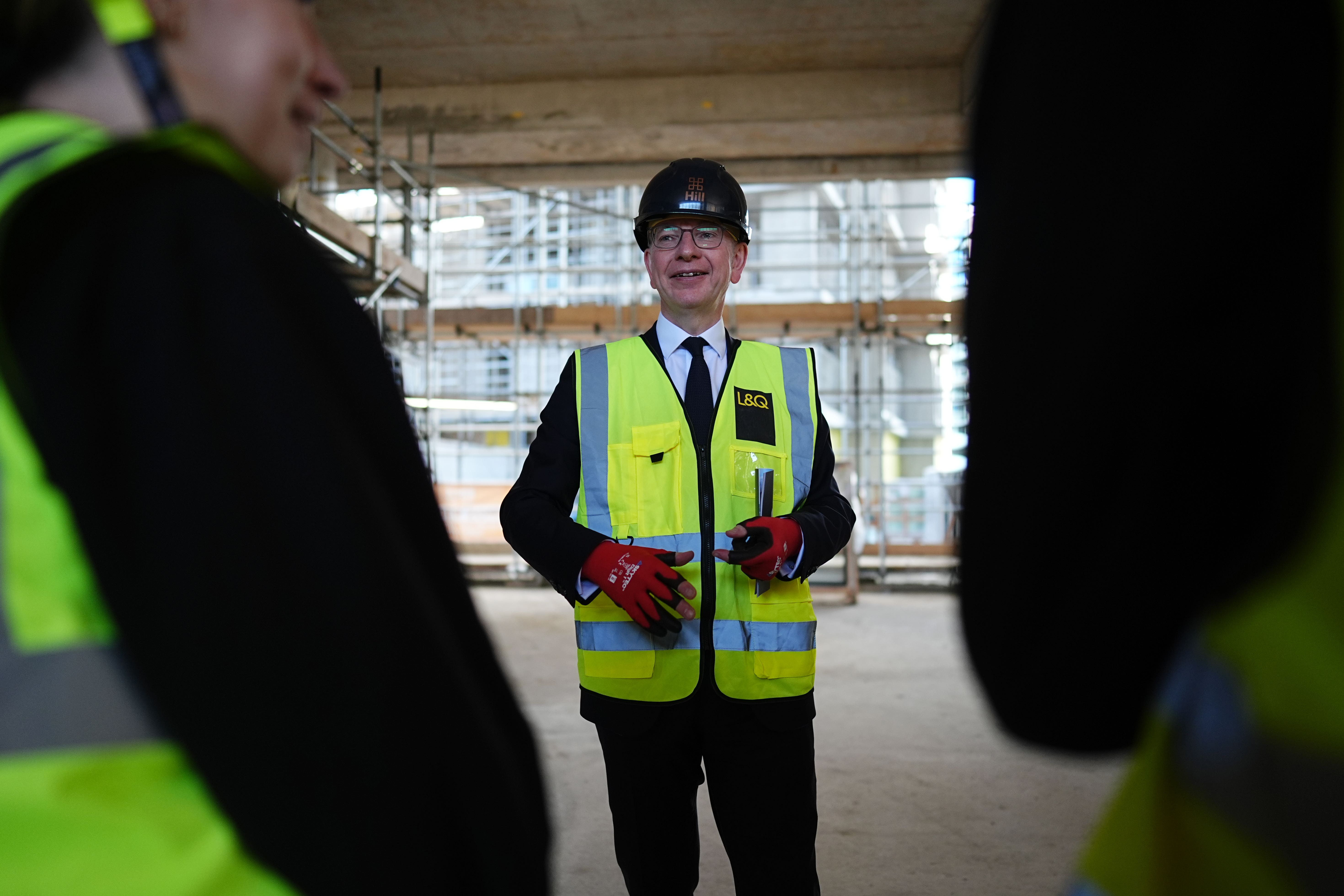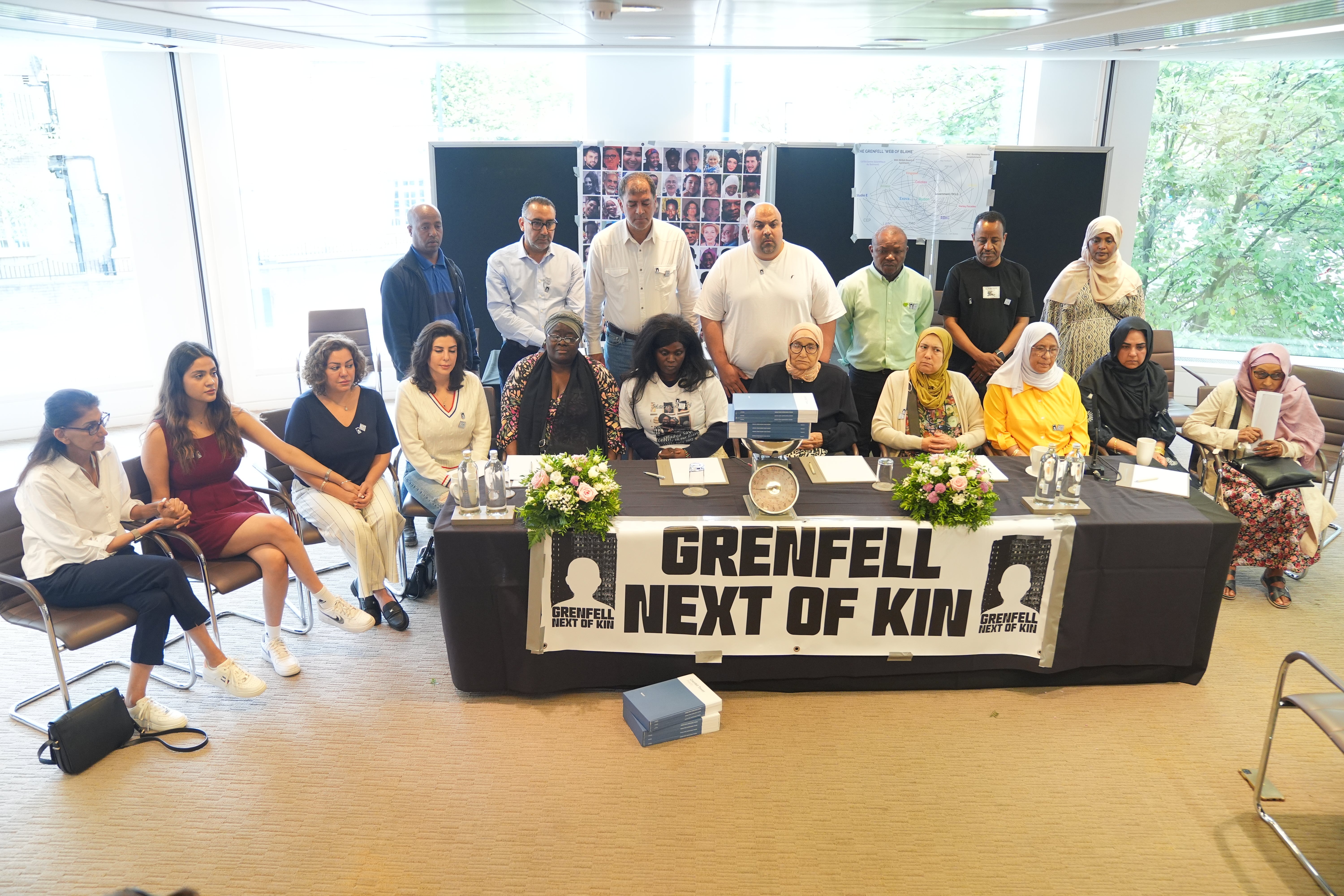UK
Why Grenfell survivor Edward Daffarn was right to sound the alarm
The council painted Daffarn as a left wing ‘troublemaker’

A protest outside Kensington and Chelsea council, who attacked Daffarn, the day of the inquiry
(Photo: Guy Smallman)
By Arthur Townend
Sunday 08 September 2024
SOCIALIST WORKERS Issue
Edward Daffarn is a survivor of the fire and a vocal resident of Grenfell. The Inquiry’s portrayal of Daffarn doesn’t just reveal the vile attitude of the Tenancy Management Organisation (TMO), but also the Inquiry’s underlying ideology.
The Inquiry says that the TMO’s repression of residents speaking out “reflects a serious failure on its part to observe its basic responsibilities”. But the report treats Daffarn as a troublemaker who blocked constructive relations between the TMO and Grenfell residents.
It continues, “The TMO regarded some of the residents as militant troublemakers led on by a handful of vocal activists, principally Edward Daffarn, whose style they found offensive. The result was a toxic atmosphere fuelled by mistrust on both sides.”
“The Inquiry is reflecting this feeling of nervousness that the ruling class feels when they are challenged by working class people,” housing campaigner Paul Burnham argued. “The language that is used is the same language used against shop stewards.
“They stereotyped Daffarn as a left wing ‘troublemaker’ who breaks up and disrupts productive meetings.
“In reality he was speaking out against the developers, so they had to silence him. All this smeary language that ends up in the report—it vindicates landlords who behave exactly the same as the TMO.”
The report doesn’t “treat people like people”. “They don’t talk about anyone else—it’s just Daffarn.”
Paul said the danger of a report that attacks victims in this way is that it sets a precedent going forward. He detailed how the report made this tension personal, but in reality it was a symptom of tensions between the ruling and working class.
“It’s not about hatred—it’s about the class, it’s about the material interests of the ruling class and not allowing any obstacles for this pursuit of profit,” said Paul.
“He was an antagonism to ruling class interests, so they had to attack him. People organising is a terrible threat to the establishment, so this brings it back to class struggle—it’s not a personal issue.”
The report does not directly blame the victims of Grenfell. It says that the “responsibility for the maintenance of the relationship between the TMO and the Grenfell community fell not on the members of that community”.
Nevertheless, it singles out Daffarn, saying, “Mr Daffarn perhaps should have stood back and questioned whether his preferred methods were the only, or even the most effective, way in which the voice of the community could be heard.”
“The report claims that whether he ever spoke for the wider community is debatable and his approach to the TMO caused resentment,” Paul said.
“That’s unacceptable because Ed’s work was supported by 100 people from 55 flats. The council’s response to this was to stop holding engagement meetings entirely—a traditional management strategy.”
The report implies that, if Daffarn had acted through the “proper channels”, the TMO would have had less hostility towards him. Perhaps it might have been more inclined to listen.
It’s an excuse for the ruling class to hide behind, diverting any questions away from the class divisions and anger that existed. The attack on Daffarn arises because the report has to defend the system of profit to avoid challenging the wider capitalist system.
Grenfell: corruption, greed and social murder
Edward Daffarn is a survivor of the fire and a vocal resident of Grenfell. The Inquiry’s portrayal of Daffarn doesn’t just reveal the vile attitude of the Tenancy Management Organisation (TMO), but also the Inquiry’s underlying ideology.
The Inquiry says that the TMO’s repression of residents speaking out “reflects a serious failure on its part to observe its basic responsibilities”. But the report treats Daffarn as a troublemaker who blocked constructive relations between the TMO and Grenfell residents.
It continues, “The TMO regarded some of the residents as militant troublemakers led on by a handful of vocal activists, principally Edward Daffarn, whose style they found offensive. The result was a toxic atmosphere fuelled by mistrust on both sides.”
“The Inquiry is reflecting this feeling of nervousness that the ruling class feels when they are challenged by working class people,” housing campaigner Paul Burnham argued. “The language that is used is the same language used against shop stewards.
“They stereotyped Daffarn as a left wing ‘troublemaker’ who breaks up and disrupts productive meetings.
“In reality he was speaking out against the developers, so they had to silence him. All this smeary language that ends up in the report—it vindicates landlords who behave exactly the same as the TMO.”
The report doesn’t “treat people like people”. “They don’t talk about anyone else—it’s just Daffarn.”
Paul said the danger of a report that attacks victims in this way is that it sets a precedent going forward. He detailed how the report made this tension personal, but in reality it was a symptom of tensions between the ruling and working class.
“It’s not about hatred—it’s about the class, it’s about the material interests of the ruling class and not allowing any obstacles for this pursuit of profit,” said Paul.
“He was an antagonism to ruling class interests, so they had to attack him. People organising is a terrible threat to the establishment, so this brings it back to class struggle—it’s not a personal issue.”
The report does not directly blame the victims of Grenfell. It says that the “responsibility for the maintenance of the relationship between the TMO and the Grenfell community fell not on the members of that community”.
Nevertheless, it singles out Daffarn, saying, “Mr Daffarn perhaps should have stood back and questioned whether his preferred methods were the only, or even the most effective, way in which the voice of the community could be heard.”
“The report claims that whether he ever spoke for the wider community is debatable and his approach to the TMO caused resentment,” Paul said.
“That’s unacceptable because Ed’s work was supported by 100 people from 55 flats. The council’s response to this was to stop holding engagement meetings entirely—a traditional management strategy.”
The report implies that, if Daffarn had acted through the “proper channels”, the TMO would have had less hostility towards him. Perhaps it might have been more inclined to listen.
It’s an excuse for the ruling class to hide behind, diverting any questions away from the class divisions and anger that existed. The attack on Daffarn arises because the report has to defend the system of profit to avoid challenging the wider capitalist system.
Grenfell: corruption, greed and social murder
The Grenfell Inquiry’s report points the finger at the government, the council and construction bosses. But housing campaigners told Arthur Townend it doesn’t go far enough

Grenfell Tower (Picture: Guy Smallman)
By Arthur Townend
Sunday 08 September 2024
Sunday 08 September 2024
SOCIALIST WORKERS Issue
The building bosses, councils and Tory government have blood on their hands. The Grenfell Tower Inquiry released its final report last Wednesday, which covered some of this.
It attacks the individual actors that killed the Grenfell residents and touches on the role of the government and deregulation in causing the deaths. But the report does not address the systemic issues and fails to get to the root causes of the Grenfell fire.
It leaves intact the structures and incentives responsible for the murder. Moyra Samuels, a housing activist in north Kensington, said, “There’s a whole issue about how council housing has been robbed by governments.
“They took funding for refurbishments out of budgets, which is why council blocks end up in states of disrepair and become dangerous. Following Grenfell, we were clear that at the heart of the fire was the question of privatisation, outsourcing and cost-cutting.
“In terms of systemic failures, all the outsourcing and privatisation was so symbolic of neoliberalism.” Deregulation is crucial to understanding Grenfell and the housing crisis in Britain.
Paul Burnham from Haringey Defend Council Housing highlighted two critical aspects of deregulation behind the murder at Grenfell. “The first is the deregulation of building control, which used to be the local authority’s responsibility.”
Building developers now pay the regulatory body to have their buildings regulated. “It has now become something that developers buy into so it means that a building never fails the inspection.
“Related to that is materials testing, which is a classic example of deregulation’s failure. The body used to be public, but it was privatised. Now, there is a private arrangement between the developer and the tester of the materials.”
This means that the results of the tests are not public. Paul said that this was a very weak point of the report, as it recommends that results should be available on request.
But this is insufficient because the report doesn’t “draw the obvious conclusion that it needs to be automatically in the public domain and there needs to be a testing authority that is not beholden to the contract with the private developers”. And the report found conclusively—the companies that produced the cladding and insulation that burst into flames on Grenfell lied.
Celotex, which produced some of the insulation, cheated the fire safety test to make its product more marketable. The other insulation manufacturer Kingspan knew for over a decade its insulation was combustible.
Arconic, which made the cladding on Grenfell, deliberately concealed the safety certification of its cladding panels to keep selling them. “If testing is done by a company trying to get money out of the product, this is the logical action,” Paul said.
But the report doesn’t properly expose this logic—of how the push for profit drove companies to make decisions that killed residents of Grenfell. “It’s an establishment report with neoliberal assumptions, so it is not prepared to draw the conclusions that would challenge the system behind these decisions,” Paul said.
One question entirely absent from the Inquiry is that of race. “On top of developers ripping through communities and building for profit, we also have the question of Islamophobia,” Moyra said.
Because it was mostly Muslims living in social housing, activists argue that the council took their concerns less seriously. If rich white people were living there, it’s likely that the council would have acted sooner.
Instead, the council of the richest borough in Britain took a dismissive attitude towards working class people and ethnic minorities, which proved deadly. “It’s institutional discrimination from the council. People want to make the case the council was in breach of the 2010 Equalities Act.”
Leaving out the question of race and Islamophobia was not an accident, but a deliberate decision. “They wouldn’t allow racism and discrimination” in the Inquiry.
“Justice4Grenfell also asked for social housing to be included in our terms of reference in the Inquiry but they wouldn’t allow it,” Moyra said. “The fact that we are not allowed to bring social housing or the issue of race into the inquiry shows the systemic failures.
“They cannot talk about these issues because it points to the wider system”—not just regulation or bad actors in specific companies. The Inquiry calls for “fundamental change” in the construction industry.
It says a regulator should oversee all aspects of the construction industry and that a government department should take responsibility for fire safety. And it demands a mandatory strategy for fire safety in high-risk buildings.
But the recommendations don’t even begin to undo the decades of deregulation and privatisation—let alone the class and racist prejudices—which led to the murder at Grenfell.
Crime and no punishment for politicians and bosses
Council and corporate bosses involved in the fire are criminals—and should be treated as such. Here are some of the top criminals.
Elizabeth Campbell took over as Tory leader of Chelsea and Kensington council in the aftermath of the disaster. At the time of the Grenfell fire, Campbell refused to apologise for the council’s actions before the fire—the council had tried to sue residents for raising safety concerns.
She remains the leader of the council. Her predecessor, Nicholas Paget-Brown was forced to stand down in the aftermath of the fire.
The disgraced Tory landed on his feet. He set up NPB Consulting, a firm to advise companies that want to do business with councils.
Rock Feilding-Mellen was the former deputy leader of Kensington Council and responsible for housing. After Grenfell, he co-founded Beckley Waves, a psychedelic therapy company.
He said taking magic mushrooms during a therapy session in Jamaica “quite literally turned my life around”. He previously said, “My heart will always ache because of their pain and suffering”—that he helped cause and has disgustingly used for financial gain.
Arconic deliberately concealed the safety risks of its cladding. Tim Myers, chief executive from 2020-23, cashed in shares of £22.3 million on top of £23.9 million in pay since Grenfell.
Chief executives Erick Asmussen and Mark Vrablec made a further £9.2 million from share sales plus £9.2 million in pay, bringing the trio’s total to almost £65 million.
Kingspan knew since 2005 that its insulation was dangerous and combustible. Eugene Murtagh, Kingspan’s founder, banked £149.3million from share sales in the seven years since Grenfell.
His son Gene Murtagh, Kingspan’s chief executive, sold a £3 million block of shares just before the damning fire test evidence emerged at the Grenfell Inquiry.
Celotex cheated fire safety exams to make its insulation more marketable. Since the fire, chief executive Pierre-André de Chalendar has taken £11.7 million, while his successor Benoit Bazin has pocketed £15.8 million since 2021.
Rydon refurbished Grenfell in 2015. Of the blocks it has built like Grenfell, 56 percent have “life critical” fire safety issues.

‘The task now falls to others to secure the justice I sought but failed to bring,’ Michael Gove says
Andy Gregory
THE INDEPENDENT
Sept. 8, 2024
Tory former housing secretary Michael Gove has claimed that the Treasury impeded his efforts to punish firms responsible for the flammable cladding on Grenfell Tower.
The damning final report of the seven-year inquiry into the blaze which killed 72 people on 14 June 2017 this week accused the three firms – Arconic, Celotex and Kingspan – whose cladding products were installed at Grenfell of “systematic dishonesty”.
The firms “engaged in deliberate and sustained strategies to manipulate the [fire safety] testing processes, misrepresent test data and mislead the market”, the 1,600-page report by Sir Martin Moore-Bick found.
In the wake of the report’s publication, the bereaved relatives of those who died in what was the worst residential fire since the Second World War are demanding manslaughter charges for those responsible after seven years without justice.
With pressure growing on government figures over the lack of accountability for Grenfell, Mr Gove – who served as housing secretary for more than two years prior to the July election – claimed in an article forThe Sunday Times that his own efforts to punish the cladding firms were stymied.
“The task now falls to others to secure the justice I sought but failed to bring,” Mr Gove wrote. “I hope the Crown Prosecution Service and Metropolitan Police will do all they can to bring criminal prosecutions quickly.
“But pursuing a few of the most guilty individuals is not enough when these companies are still making vast profits without acknowledging their full responsibility.”
Accusing the three firms of having “willingly, knowingly, recklessly put greed ahead of decency”, Mr Gove alleged that his own attempts to restrict imports of their products ran up against the “commercial purism of Treasury Mandarin Brain”. The Treasury was approached for comment.

Former housing secretary Michael Gove apologised to the relatives and survivors of the Grenfell Tower fire (Aaron Chown/PA)
And the former Tory minister said there had been “insufficient action” from foreign governments on companies based overses.
“Because Kingspan is based in Ireland, and Arconic’s European operations and Celotex are in France, our jurisdiction was limited. But we were determined to go after them,” Mr Gove said.
He claimed to have “pressed the Irish government to act against Kingspan without success”, while receiving “only haughty froideur” from France.
Warning that “taking the necessary action will require toughness”, he wrote: “I worry that the new government may be dissuaded from doing everything necessary by those counselling caution.”

And the former Tory minister said there had been “insufficient action” from foreign governments on companies based overses.
“Because Kingspan is based in Ireland, and Arconic’s European operations and Celotex are in France, our jurisdiction was limited. But we were determined to go after them,” Mr Gove said.
He claimed to have “pressed the Irish government to act against Kingspan without success”, while receiving “only haughty froideur” from France.
Warning that “taking the necessary action will require toughness”, he wrote: “I worry that the new government may be dissuaded from doing everything necessary by those counselling caution.”

Grenfell United had called for Arconic witnesses in France to come to give evidence to the Grenfell Tower Inquiry (Kirsty O’Connor/PA)
Citing arguments in Whitehall that the cladding firms “can be partners in combating climate change”, that the UK “shouldn’t pick fights with EU neighbours when we want a closer commercial relationship” and that pursuing companies abroad could deter foreign investment, Mr Gove said: “I understand all those arguments.
“But you cannot purchase prosperity at the price of justice. You cannot build a safe home for the vulnerable on an unquiet grave. You cannot allow the unacceptable face of capitalism to be left smirking when the tears of victims are still wet. Those who are the guiltiest must pay, and pay the most.”
However, Grenfell Next of Kin – a group whose immediate family members died at Grenfell – accused Mr Gove of “historical revisionism”.
In a statement to The Independent, the group said: “Has he forgotten he was in cabinet almost continuously from 2010 onwards, and the coalition government of David Cameron with his policy of ‘bonfire of regulations’ which launched a deregulation of planning standards? The political and policy decisions that embraced the ‘unacceptable face of capitalism’ he speaks of?
“He nudges us with emotive language of ‘purchasing prosperity at the price of justice’ and ‘our wet tears’ when it was precisely these policies that created the wild west conditions that allow these manufacturers to do harm.
“It is the ashes of his government’s ‘bonfire of regulation’ that were returned to us, the ashes of our kin to be buried. Thanks for championing our justice, but we think we got this from here on.”

Citing arguments in Whitehall that the cladding firms “can be partners in combating climate change”, that the UK “shouldn’t pick fights with EU neighbours when we want a closer commercial relationship” and that pursuing companies abroad could deter foreign investment, Mr Gove said: “I understand all those arguments.
“But you cannot purchase prosperity at the price of justice. You cannot build a safe home for the vulnerable on an unquiet grave. You cannot allow the unacceptable face of capitalism to be left smirking when the tears of victims are still wet. Those who are the guiltiest must pay, and pay the most.”
However, Grenfell Next of Kin – a group whose immediate family members died at Grenfell – accused Mr Gove of “historical revisionism”.
In a statement to The Independent, the group said: “Has he forgotten he was in cabinet almost continuously from 2010 onwards, and the coalition government of David Cameron with his policy of ‘bonfire of regulations’ which launched a deregulation of planning standards? The political and policy decisions that embraced the ‘unacceptable face of capitalism’ he speaks of?
“He nudges us with emotive language of ‘purchasing prosperity at the price of justice’ and ‘our wet tears’ when it was precisely these policies that created the wild west conditions that allow these manufacturers to do harm.
“It is the ashes of his government’s ‘bonfire of regulation’ that were returned to us, the ashes of our kin to be buried. Thanks for championing our justice, but we think we got this from here on.”

Members of a support group for the next of kin and families of some the 72 people killed in the Grenfell Tower fire (Yi Mok/PA)
Warning that all those to blame for Grenfell need to be punished, the group added: “The deliberate deflection of the responsibility of the state in our tragedy by Michael Gove ignoring the role of the Royal Borough of Kensington and Chelsea, a Tory jewel in the crown where he and half the Tory cabinet lived at the time of the fire, and the Tory government at the time of the refurbishment of the tower, is historical revisionism at best.”
Apologising in The Times for the government’s failures, Mr Gove criticised the “many others who failed the victims of Grenfell”, including tenant managers, Kensington and Chelsea Borough Council, the Building Research Establishment, and developers
Speaking to the BBC’s Sunday With Laura Kuenssberg, Sir Keir Starmer said “appropriate cases should go through to court”, with the prime minister adding: “The worst we could do is say or do anything which would prejudice the outcome of any proceedings.”
Additional reporting by PA
Warning that all those to blame for Grenfell need to be punished, the group added: “The deliberate deflection of the responsibility of the state in our tragedy by Michael Gove ignoring the role of the Royal Borough of Kensington and Chelsea, a Tory jewel in the crown where he and half the Tory cabinet lived at the time of the fire, and the Tory government at the time of the refurbishment of the tower, is historical revisionism at best.”
Apologising in The Times for the government’s failures, Mr Gove criticised the “many others who failed the victims of Grenfell”, including tenant managers, Kensington and Chelsea Borough Council, the Building Research Establishment, and developers
Speaking to the BBC’s Sunday With Laura Kuenssberg, Sir Keir Starmer said “appropriate cases should go through to court”, with the prime minister adding: “The worst we could do is say or do anything which would prejudice the outcome of any proceedings.”
Additional reporting by PA
No comments:
Post a Comment